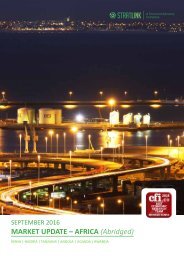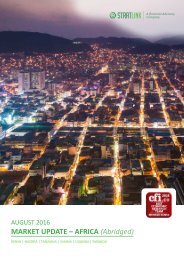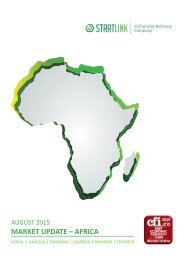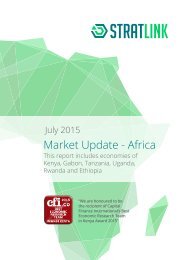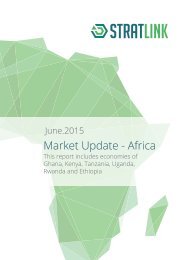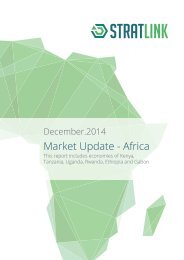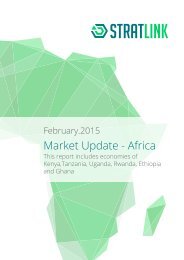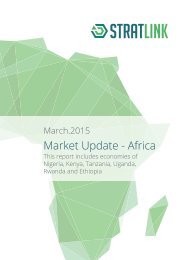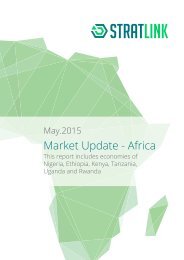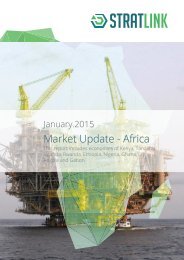Africa Market Update - April 2015
Includes economies of Kenya, Uganda, Tanzania, Rwanda, Ethiopia and Angola
Includes economies of Kenya, Uganda, Tanzania, Rwanda, Ethiopia and Angola
You also want an ePaper? Increase the reach of your titles
YUMPU automatically turns print PDFs into web optimized ePapers that Google loves.
MARKET UPDATE – AFRICA | March <strong>2015</strong><br />
BUSINESS ENVIRONMENT<br />
POLITICAL OUTLOOK<br />
Judicial Reforms: Will they fit the Bill?<br />
Judicial reforms are set to commence in the<br />
course of the first half of <strong>2015</strong> with a view to<br />
strengthening adherence to human rights<br />
and address delayed judgement of cases.<br />
Agriculture to Shape Business Focus<br />
As the country grapples with depressed oil prices, investors<br />
are likely to shift focus to sectors driving economic diversification.<br />
Agriculture presents a lucrative sector as the country<br />
looks to address a high food import bill.<br />
Agriculture as % of GDP<br />
Source: EcoBank <strong>Update</strong>, StratLink <strong>Africa</strong><br />
Angola’s agricultural productivity stands below that of peer<br />
economies in Sub-Saharan <strong>Africa</strong> and could present a viable<br />
investment opportunity given high population growth rate<br />
(3.1% per annum as at 2013 11 ). Between 2000 and 2010,<br />
Angola’s cereal yield per hectare accelerated at 60.0 bps<br />
slower than the Sub-Saharan <strong>Africa</strong> average at 12.5%.<br />
Cereal Yield (Kg/Hectare)<br />
‘00 ‘10 Variance<br />
In November 2014, Amnesty International<br />
accused security forces of stifling dissent<br />
against the government and extra-judicial<br />
killings. This points to an environment of<br />
constrained democratic freedom that is<br />
bound to negatively impact the country’s<br />
political risk perception amongst investors.<br />
Constitution: Teething Questions<br />
Despite a stable political environment since<br />
2002 and adoption of a new constitution in<br />
2010, a number of factors are likely to keep<br />
the country’s political climate fragile in the<br />
coming years. One, incumbent President,<br />
Jose Eduardo dos Santos, has been at the<br />
helm since 1979 with the new constitution<br />
having allowed him to seek another five<br />
year term in 2012.<br />
Likely Groundswell of Discontent<br />
In the run-up to the next election (2017),<br />
the opposition is likely to capitalize on the<br />
incumbent’s prolonged reign in eliciting<br />
public discontent and clamour for change.<br />
Coupled with a deteriorating economic<br />
environment occasioned by the plunge<br />
in oil prices, the government risks facing<br />
a groundswell of dissatisfaction from the<br />
masses between <strong>2015</strong> and 2016.<br />
Ruling MPLA saw its margin of victory in the<br />
last elections decrease as the main opposition<br />
party, UNITA, managed to increase its<br />
share of votes cast.<br />
Election History: Percentage of Votes<br />
‘08 ‘12<br />
MPLA 81.6% 71.8%<br />
UNITA 10.4% 18.7%<br />
Others 8.0% 9.5%<br />
Source: FES Policy Analysis, StratLink <strong>Africa</strong><br />
South <strong>Africa</strong> 2,755.0 4,162.0 16.8%<br />
Malawi 1,676.0 2,206.0 14.6%<br />
Zambia 1,682.0 2,547.0 16.8%<br />
Kenya 1,375.0 1,613.0 13.0%<br />
SSA Average 1,131.0 1,336.0 13.1%<br />
Angola 572.0 644.0 12.5%<br />
11 World Bank Estimates 2014<br />
Source: World Bank, StratLink <strong>Africa</strong><br />
26 | StratLink <strong>Africa</strong> Ltd.<br />
www.stratlinkglobal.com




